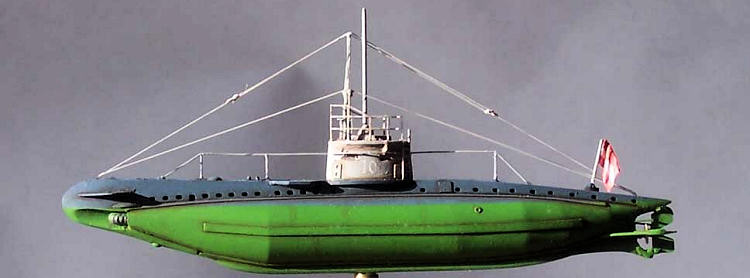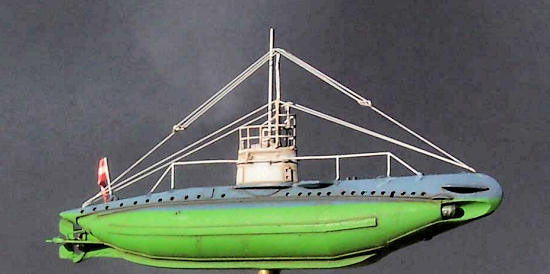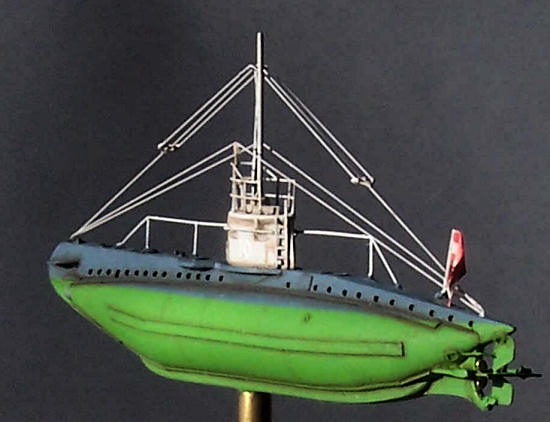U-Boat Laboratoriumís
1/350 Austro-Hungarian WWI Type UB-I submarine
|
KIT #: |
350-1 |
|
PRICE: |
15 Euro |
|
DECALS: |
None |
|
REVIEWER: |
Kyle Bodily |
|
NOTES: |
Resin. Built as the A-H
SMU-10 |

The K.u.K.
SMU-10
started life as the German SMS UB-1.
She was the first boat in the new UB-I class coastal submarine.
In the Austro-Hungarian Navy she was the first of what was called the
U-10 class of boat.
The
SMU-10
was built in
Germany
at the Friedrich Krupp Germaniawerft in
Kiel.
After completion she was shipped by rail to Pola where the final assembly
took place. One of the advantages
of the UB-Is were that they could be broken down into components for shipping
and then reassembled in about four weeks for the entire apportion.
 On
the 22nd of
January 1915
she was commissioned as the UB-1 in the Imperial German Navy. On the
26 Jun 1915
the UB-1 sank her one and only ship.
The 120 tons Royal Italian Navy torpedo boat Torpediniere 5 Pn.
She had no other success in the war.
On
the 22nd of
January 1915
she was commissioned as the UB-1 in the Imperial German Navy. On the
26 Jun 1915
the UB-1 sank her one and only ship.
The 120 tons Royal Italian Navy torpedo boat Torpediniere 5 Pn.
She had no other success in the war.
On
the 4th of July
1915
the UB-1 was handed over to the Kaiserliche und KŲnigliche Kriegsmarine and was
commissioned as the
SMU-10.
She served in the Imperial Austro-Hungarian Navy until the end of the
war. On
9 July 1918
she hit a mine and was heavily damaged.
Her captain was able to beach her with no loss of life.
The heavily damaged U-10 was towed to
Trieste
to undergo repairs but the war ended before they could be completed.
Austro-Hungarian boats
carried two torpedoes just like the German boats but had different deck guns.
Instead of the German 8mm MG 08 the Austro-Hungarian boats were reported
to mount a 37mm L/23 SFk quick-firing gun or a 47mm L/44 SFk quick-firing gun.
The only problem here is that I havenít been able to find any pictures of
Austro-Hungarian UB-Is that are clear enough to determine the type of deck gun
that they had. Oh well, Iíve also
seen many pictures of boats without guns mounted so may be Iíll do mine without
a deck gun stowed.
Before the end of the war
the Imperial Austro-Hungarian Navy operated five UB-I type boats.
The U-10 was the ex UB-1, the U-11 was the ex UB-15 and the U-15, U-16, U17
were commissioned directly into the Austro-Hungarian Navy.
After the war the U-10 was handed over to the Italian government as war
reparations and scrapped in 1920.
If you read my first build
of the German UB-1 you will know about all there is to know concerning this kit.
Nothing has changed here except this copy had two little air bubbles on
the bottom of the hull. All I did
here was add a little putty to fill the holes and sand.
 The
build was about the same, the only thing different was that this build was much
faster. This one took three
evenings. The first one took about
five evenings. The only thing that
really takes time is that I like to let the superglue dry before I add the next
part so the first part will be as solid as possible.
I find that it takes about three to five minuets for things too solid up
enough for the next part. And I
donít seem to knock off parts as often.
The
build was about the same, the only thing different was that this build was much
faster. This one took three
evenings. The first one took about
five evenings. The only thing that
really takes time is that I like to let the superglue dry before I add the next
part so the first part will be as solid as possible.
I find that it takes about three to five minuets for things too solid up
enough for the next part. And I
donít seem to knock off parts as often.
I always mount a
brass tube in the hull that will become part of the stand when I finish.
This is what I use to handle the model while I build it.
In other words this little handle helps me hold and manipulate the model
with out my big monster fingers knocking off all the little parts.
When I built the
German boat I had to build the very tiny deck gun, a little 8mm machine gun.
The picture of the U-10 that I used to build this model did not have a
deck gun so I built this model without a deck gunÖÖ
There now wasnít that easy.
I added the
little periscope and antenna mast. Then I drilled two little holes for the
rigging, then painted.
After painting,
I added the rigging and radio antennas and finely weathered the whole thing.
Iím kind of wedded to the same weathering process that I use for
basically everything.
To add a little
more to the build I used my printer to make an Austro-Hungarian flag for the
flagpole and a little nameplate. I
liked this so much that Iíve started to make flags and name plates for all my
ship models.
This is where the K.u.K.
KRIEGSMARINE web site was indispensable.
From this I could see that the Austro-Hungarian Navy, as a rule of thumb
painted their U-boats with a very light gray color on the conning tower and the
upper hull was a very dark color.
 Iíve
not seen a photo of an Austro-Hungarian submarine out of the water but from all
of my research Iíve found that the Austro-Hungarian Navy painted the part of the
hull in the water a kind of yellow-blue-green color.
I think the colors look very much like Lfd. Nr.11 Deckfarbe Grun/Chromgrun
for the
Hull
below the water line. Above the
water line I would say Lfd. Nr.33-3 Dunkelblau and I would call the conning
tower Lfd. Nr.4 Deckfarbe Hellgrau/Silbergrau.
I had to mix all three colors so donít ask me how I did it or what colors
I used. The whole operation was a
little of this and a drop of that until I was happy with the color.
I did find when I had finished mixing the colors that I had enough for a
couple of Battleships or should I say Schlachtschiffen.
Iíve
not seen a photo of an Austro-Hungarian submarine out of the water but from all
of my research Iíve found that the Austro-Hungarian Navy painted the part of the
hull in the water a kind of yellow-blue-green color.
I think the colors look very much like Lfd. Nr.11 Deckfarbe Grun/Chromgrun
for the
Hull
below the water line. Above the
water line I would say Lfd. Nr.33-3 Dunkelblau and I would call the conning
tower Lfd. Nr.4 Deckfarbe Hellgrau/Silbergrau.
I had to mix all three colors so donít ask me how I did it or what colors
I used. The whole operation was a
little of this and a drop of that until I was happy with the color.
I did find when I had finished mixing the colors that I had enough for a
couple of Battleships or should I say Schlachtschiffen.
So I painted the
boat very light gray for the conning tower, dark bluegray for the upper hull and
that very unique shade of yellowgreen for the lower hull.
A very striking and interesting mix of colors if I do say so myself.
Many of the
Austro-Hungarian Navy subs had a red white red flash on their bows to help
identify them. But I couldnít find
a good picture of this boat with a flash so I chose not to do one on this model.
I touched every
thing up with a fine paintbrush and added the rigging.
Finally I weathered the whole thing.
For the
weathering I start out with a very diluted color like rust.
The paint is so diluted that only one coat is almost undetectable.
I just add coats to darken it as needed.
I really like this method, as any one coat is really not noticeable.
So if you make a mistake you will not see it unless you make the same
mistake several times. It is the
addition of coats that make things get slowly darker and grungier
 Well
there you have it. This is now the
second time that Iíve built this kit and I still love it.
It is simple with just enough difficulty to make it interesting and with
the fact that more than one country used this type, there is the opportunity to
research diverse boats. I had a lot
of fun researching this build and like the way it turned out.
The colors may not be perfect but I think that they would look close.
Well
there you have it. This is now the
second time that Iíve built this kit and I still love it.
It is simple with just enough difficulty to make it interesting and with
the fact that more than one country used this type, there is the opportunity to
research diverse boats. I had a lot
of fun researching this build and like the way it turned out.
The colors may not be perfect but I think that they would look close.
I highly
recommend this kit. 1/350th
is about as big as you can get and still have a good number of other ships in
scale that you can compare size with.
One thing that I
hope to convey is that like many models you donít have to always build it as it
was intended and that you can have a lot of fun researching some of the
different options that are always present in a kit.
ďK.u.K. KRIEGSMARINEĒ
http://www.kuk-kriegsmarine.at/
This site is a German language site and the best that Iíve found on the Imperial
Austro-Hungarian Navy. Itís just
full of good stuff including high quality photographs.
ďU-boats of the
Kaiserís NavyĒ Osprey New Vanguard #50
ďThe U-boat netĒ
www.uboat.net lots of information here.
I consider this site the single best reference on the web.
Many Internet searches
Kyle
Bodily
April 2010
If you would like your product reviewed fairly and quickly, please
contact
me or see other details in the
Note to
Contributors.
Back to the Main Page
Back to the Review
Index Page


 On
On
 The
build was about the same, the only thing different was that this build was much
faster. This one took three
evenings. The first one took about
five evenings. The only thing that
really takes time is that I like to let the superglue dry before I add the next
part so the first part will be as solid as possible.
I find that it takes about three to five minuets for things too solid up
enough for the next part. And I
donít seem to knock off parts as often.
The
build was about the same, the only thing different was that this build was much
faster. This one took three
evenings. The first one took about
five evenings. The only thing that
really takes time is that I like to let the superglue dry before I add the next
part so the first part will be as solid as possible.
I find that it takes about three to five minuets for things too solid up
enough for the next part. And I
donít seem to knock off parts as often.
 Iíve
not seen a photo of an Austro-Hungarian submarine out of the water but from all
of my research Iíve found that the Austro-Hungarian Navy painted the part of the
hull in the water a kind of yellow-blue-green color.
I think the colors look very much like Lfd. Nr.11 Deckfarbe Grun/Chromgrun
for the
Iíve
not seen a photo of an Austro-Hungarian submarine out of the water but from all
of my research Iíve found that the Austro-Hungarian Navy painted the part of the
hull in the water a kind of yellow-blue-green color.
I think the colors look very much like Lfd. Nr.11 Deckfarbe Grun/Chromgrun
for the  Well
there you have it. This is now the
second time that Iíve built this kit and I still love it.
It is simple with just enough difficulty to make it interesting and with
the fact that more than one country used this type, there is the opportunity to
research diverse boats. I had a lot
of fun researching this build and like the way it turned out.
The colors may not be perfect but I think that they would look close.
Well
there you have it. This is now the
second time that Iíve built this kit and I still love it.
It is simple with just enough difficulty to make it interesting and with
the fact that more than one country used this type, there is the opportunity to
research diverse boats. I had a lot
of fun researching this build and like the way it turned out.
The colors may not be perfect but I think that they would look close.